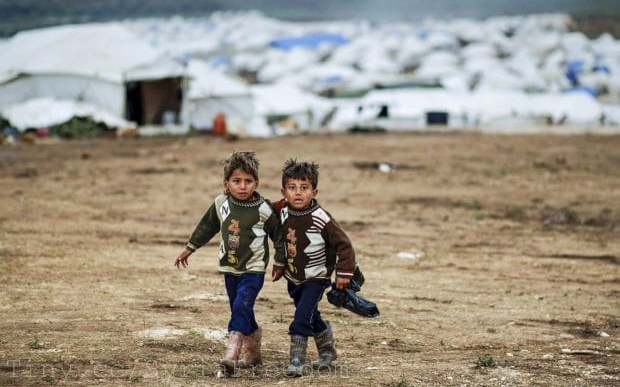Children in the Rukban camp for displaced Syrians near the Jordanian border (File)
More displaced Syrians have left the Rukban camp in the southeast of the country, capitulating to a months-long siege and “dire food situation”. But at the same time, claims are circulating of more disappearances and arrests — this time including women — in the regime centers to which the displaced are taken.
On Wednesday, 1,379 civilians left Rukban, in a barren area on the Jordanian border, said Viktor Kupchishin, head of the Russian Center for “Reconciliation”. A local source confirmed the departures to EA.
The latest transfer to detention centers in Homs Province bring the total to about 8,500 of the camp’s estimated 40,000 residents since March 26.
At the same, there were more claims of people being taken from the centers, following previous arrests and the killing of at least five men.
EA was told by a source that 20 women and six men were arrested at one of the centers, a school in Al Bayadah in Homs. While the UN has said some men are still answering questions posed by authorities, the reason for the claimed seizure of the women is unknown.
In a February UN survey, more than 90% of Rukban’s residents said they wanted to leave, but all expressed concerns about detentions, forced conscription, and uncertainty of their personal status and that of their property.
Earlier this month, three men were reportedly killed by regime personnel when they tried to stop the harassment of a woman.
Syria Reports: 3 Men Executed by Regime After Leaving Rukban Camp
UN personnel were finally allowed into the centers on April 24, after weeks of being blocked, but offered only a cursory report saying that 90% of the displaced had been permitted to return to home areas but some men had to “settle their status with the authorities”.
Kupchishin made no reference to the situation in the centers, instead trying to explain why the rest of Rukban’s displaced are still holding out against transfer — despite acute shortages of food, medicine, and essentials, with scores dying since last autumn.
He made the unsupported claim that US military personnel are preventing departures.
Rukban is within a 55-km (34-mile) security zone around the US base at Tanf, on the Iraq border. However, the Americans have refused to intervene, including with the provision of aid, apparently out of concern over a confrontation with the Russians.
“Live on Onion and Water Rather Than Be Locked Up”
The displaced fled to Rukban from 2015, when their home areas were attacked by the Islamic State. The camp has been besieged since September, when Assad regime forces cut the main route into Rukban. The regime has refused all but two UN attempts to deliver aid since January 2018, issuing another rejection last week.
The cutoff has been compounded by Jordan’s closure of the border since June 2016, following an ISIS suicide attack that killed several Jordanian personnel.
The price of food, if it is available, has soared. Residents say that some of them are down to one basic meal per day, often bread and olive oil or yogurt. The UN says thousands of children are at risk, with parents saying the young are frail from being given sugared water instead of powdered milk.
Despite the conditions, residents held out against departure. A Russian declaration of “humanitarian corridors” via two military checkpoints in February was rebuffed with no civilians showing up. However, the worsening of the food crisis and the lack of medical care finally prompted the transfers, mainly of women and children, from late March.
Those who do leave are charged about $15 to make their way to the Russian checkpoints. Sources from the centers and camp say that, to leave the centers in Homs, a larger amount must be paid — in the case of one mother and her son last week, about $150.
Syria Daily, April 28: Regime Threatens Rukban Camp with Starvation, Forces Those Who Leave to Pay
Those inside Rukban are still defiant. Mamdouh, a 35-year-old technician from Tadmour in central Syria, says he and his family will remain:
We had neighbours who left, only to disappear. We have heard nothing about them. There are spies in this camp, too.
Most [residents] are patient and desensitized. We would rather live on onion and water every day in open land than go back and be locked up.

